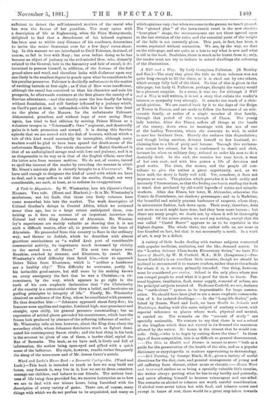A Visit to Abyssinia. By W. Winstanley, late 4th (Queen's
Own) Hussars. Two vols. (Hurst and Blackett.)—It is Mr. Winstanley's misfortune, not his fault, that these two lively volumes have come somewhat late into the market. The work descriptive of Colonel Gordon's doings in Central Africa, which we reviewed some time ago, has to a large extent anticipated them, con- taining as it does an account of an important interview the Colonel had with King Johannes of Abyssinia. Mr. Winstan- ley's experiences are mainly valuable as showing that it is not such a difficult matter, after all, to penetrate into the heart of Abyssinia. He proceeded from this country to Suez in the ordinary way, and thence to Jeddah, which he describes with almost gazetteer succinctness as "a walled Arab port of considerable commercial activity, its importance much increased by vicinity to the sacred town of Mecca." His next two stages were Sonakim, reached by steamer, and Khartoum, by camel. Mr. Winstanley's chief difficulty then faced him,—how to approach Debra Tabor from Khartoum, which is "neither a handsome nor a healthy city." This difficulty he overcame, partly by hie invincible good-nature, but still more by his making known on every emergency the fact that he was a Christiam—a cir- cumstance, by the way, which appears to go right in the teeth of his own emphatic declaration that "the Christianity of the country is a ceremonial rather than a belief, and inculcates no guiding principles to integrity of life." Finally, Mr. Winstanley obtained an audience of the King, whom be conciliated with presents. He thus describes him :—" Johannes appeared about forty-five; his features were aquiline and regular, forehead high, nose prominent and straight, eyes chilly, his general presence commanding ; but an expression of settled gloom pervaded his countenance, which bore the frozen look produced by absence of the softening influence of smiles." Mr. Winstanley tells us less, however, about the King than about the secondary chiefs, whom Johannes dominates much as Egbert domi- nated his contemporary Saxon rivals; and the best thing in his book is the account he gives of one of these, a border chief, styled the Ras of Baramba. The book, as we have said, is lively and full of information, the author being open-eyed and gifted with a quick sense of the ludicrous. His style, however, recalls rather frequently the slang of the mess-room and of Mr. James Grant's novels.


































 Previous page
Previous page